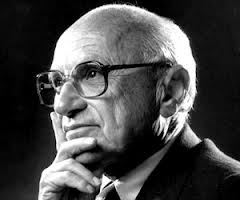From redefinED co-host Doug Tuthill: Milton Friedman and Jack Coons were intellectual giants in their respective disciplines (Friedman in economics and Coons in law) and strong school choice advocates. But their rationales differed and this led to many interesting – and often contentious – debates. Despite their differences, their debates were always courteous and civil. So when Dr. Friedman died in 2006, his foundation asked Jack to write a chapter in a book honoring Dr. Friedman’s memory, and he agreed. Today is Dr. Friedman’s 100th birthday, so we again asked Jack to share some thoughts on Dr. Friedman, and again he agreed.
Milton Friedman was an economic libertarian of singular intellectual purity. I am less pure, and to me Friedman’s way of modeling the ideal educational triangle of parent, school and child has seemed a simplification limiting our perception of the social implications and, thus, of the politics of choice. I have said all this before. Why, then, do I gladly join this chorus of praise for what I have criticized?
It is not from mere personal fondness for the man. It is, rather, because it was Friedman’s specific application of free market dogma to schools at a particular historical moment that made it possible for a vigorous critique of the American model even to begin. His cry in the night may not have been the first; nor was it the sufficient cause of the great awakening—but it was probably necessary.
Our national mind had long been frozen in admiration of an arrangement comfortable to the middle class, but incapable of realizing education in a democratic way. There is no version of our historic district model of school assignment, even with charter schools, that can in practice achieve what the Europeans honor under the cumbrous but useful title “subsidiarity.” That word warns us to keep authority over the lives of persons either in their own hands or as close to the individual—and in as small a group—as possible. If bowling were our subject, few of us might prefer bowling alone, but neither would we wish to be directed by government to bowl with the people next door.
Left to themselves, humans cluster freely in diverse ways, most of which are innocent and some even creative; their clumps and hives are generally the better for having been chosen. And, if diversity and the smaller unit can serve the purpose, let us lodge the power there.
Subsidiarity could be realized only in a corrupted way by our old district systems. True, some of us can choose to bundle in Beverly Hills, but…and you know the rest of that story; it is daily thrust in our face by the media, and it is true. Many among us just can’t choose Beverly Hills. So at government command my child must learn whatever ideas happen to get taught and whatever behavior gets encouraged in Berkeley.
It was Milton Friedman who in our time rediscovered and announced that this fate of the have-not child was neither efficient nor necessary. A lot of people heard him. Most who did were at first shocked that this sacred cow of democracy, the public education system, had been labeled as a clumsy, self-defeating, anti-social monopoly. But some did begin to listen. And in spite of the system’s sputtering and posturing, they still do. Friedman’s defamation of the schools has begun to stick.
I think he actually underplayed his hand.
As I will say in a separate posting, his was a far more important revelation than he claimed. The opportunity he saw had implications beyond efficiency and test scores. And his free market call eventually awakened civically sensitive minds. Some at least could see that Friedman’s hope, properly instrumented, could sow the seed of America’s rediscovery of the family; it could help to mend the souls of citizens separated by their government from their happy burden of responsibility.
In short, Friedman’s market perspective identified the right place to lodge authority and thereby realize the ideal of subsidiarity in its many potential democratic forms. That his message came in the language of the dismal science may have reduced its immediate political horsepower. I will say so later. But, in any case, today’s cheerleaders of choice can broadcast its blessings beyond those of efficiency. Friedman’s observation that educational markets can raise test scores and save money is completely consistent with that more ultimate hope for a rebirth of a humane and responsible community experienced by parents and families at every economic level – a community nourished by its exercise of personal choice regarding its own children.


